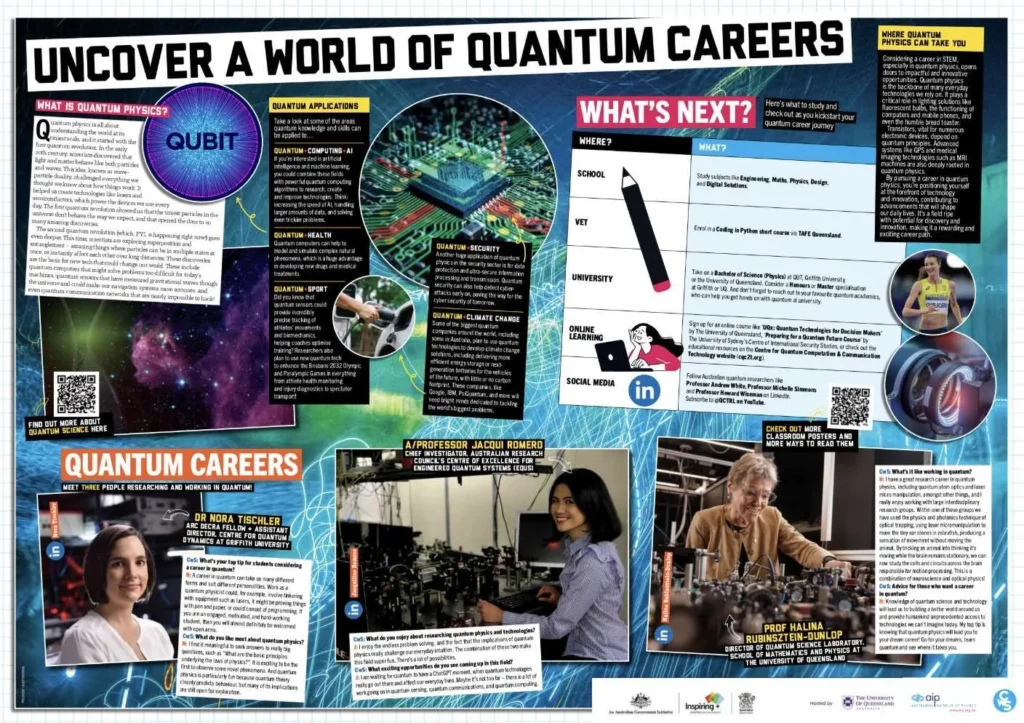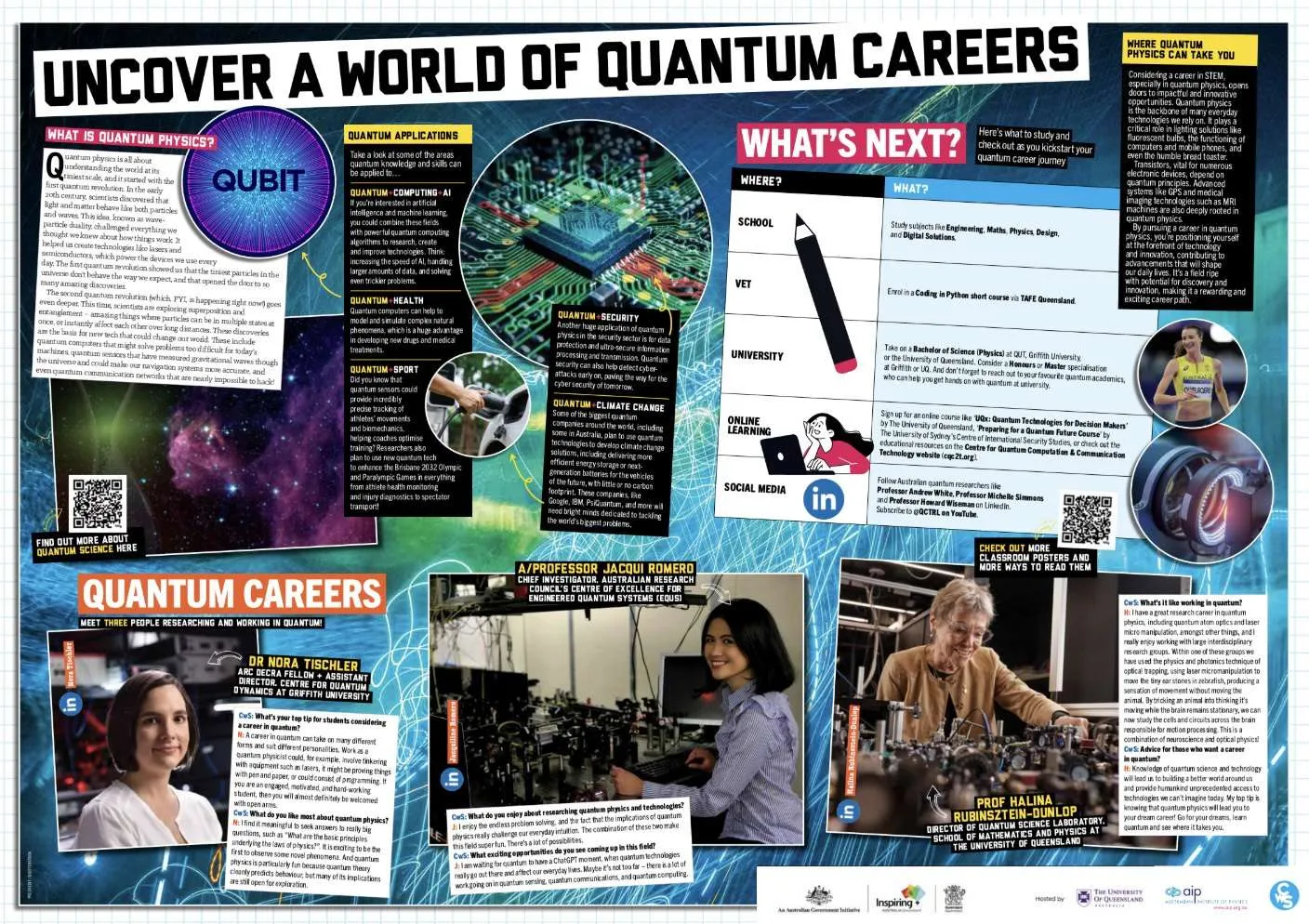Reproduced from Careers in STEM magazine
What is quantum physics?
Quantum physics is all about understanding the world at its tiniest scale, and it started with the first quantum revolution. In the early 20th century, scientists discovered that light and matter behave like both particles and waves. This idea, known as wave-particle duality, challenged everything we thought we knew about how things work. It helped us create technologies like lasers and semiconductors, which power the devices we use every day. The first quantum revolution showed us that the tiniest particles in the universe don’t behave the way we expect, and that opened the door to so many amazing discoveries.
The second quantum revolution (which, FYI, is happening right now!) goes even deeper. This time, scientists are exploring superposition and entanglement – amazing things where particles can be in multiple states at once, or instantly affect each other over long distances. These discoveries are the basis for new tech that could change our world. These include quantum computers that might solve problems too difficult for today’s machines, quantum sensors that have measured gravitational waves though the universe and could make our navigation systems more accurate, and even quantum communication networks that are nearly impossible to hack!

Quantum applications
Quantum+Computing & AI
If you’re interested in artificial intelligence and machine learning, you could combine these fields with powerful quantum computing algorithms to research, create and improve technologies. Think: increasing the speed of AI, handling larger amounts of data, and solving even trickier problems.
Quantum + Health
Quantum computers can help to model and simulate complex natural phenomena, which is a huge advantage in developing new drugs and medical treatments.
Quantum + Sport
Did you know that quantum sensors could provide incredibly precise tracking of athletes’ movements and biomechanics, helping coaches optimise training? Researchers also plan to use new quantum tech to enhance the Brisbane 2032 Olympic and Paralympic Games in everything from athlete health monitoring and injury diagnostics to spectator transport!
Quantum + Security
Another huge application of quantum physics in the security sector is for data protection and ultra-secure information processing and transmission. Quantum security can also help detect cyber-attacks early on, paving the way for the cyber security of tomorrow.
Quantum + Climate change
Some of the biggest quantum companies around the world, including some in Australia, plan to use quantum technologies to develop climate change solutions, including delivering more efficient energy storage or next-generation batteries for the vehicles of the future, with little or no carbon footprint. These companies, like Google, IBM, PsiQuantum, and more will need bright minds dedicated to tackling the world’s biggest problems.
Where quantum physics can take you
Considering a career in STEM, especially in quantum physics, opens doors to impactful and innovative opportunities. Quantum physics is the backbone of many everyday technologies we rely on. It plays a critical role in lighting solutions like fluorescent bulbs, the functioning of computers and mobile phones, and even the humble bread toaster.
Transistors, vital for numerous electronic devices, depend on quantum principles. Advanced systems like GPS and medical imaging technologies such as MRI machines are also deeply rooted in quantum physics.
By pursuing a career in quantum physics, you’re positioning yourself at the forefront of technology and innovation, contributing to advancements that will shape our daily lives. It’s a field ripe with potential for discovery and innovation, making it a rewarding and exciting career path.
What’s next?
Here’s what to study and check out as you kickstart your quantum career journey.
School: Study subjects like Engineering, Maths, Physics, Design, and Digital Solutions.
VET: Enrol in a Coding in Python short course via TAFE Queensland.
University: Take on a Bachelor of Science (Physics) at QUT, Griffith University, or the University of Queensland. Consider a Honours or Master specialisation
at Griffith or UQ. And don’t forget to reach out to your favourite quantum academics, who can help you get hands on with quantum at university.
Online learning: Sign up for an online course like ‘UQx: Quantum Technologies for Decision Makers’ by The University of Queensland, ‘Preparing for a Quantum Future Course’ by The University of Sydney’s Centre of International Security Studies, or check out the educational resources on the Centre for Quantum Computation & Communication Technology website (cqc2t.org).
Social media: Follow Australian quantum researchers like Professor Andrew White, Professor Michelle Simmons and Professor Howard Wiseman on LinkedIn. Subscribe to @QCTRL on YouTube.
Quantum careers
Meet three people researching and working in quantum!
Dr Nora Tischler
ARC DECRA Fellow + Assistant
Director, Centre for Quantum Dynamics at Griffith University
CwS: What’s your top tip for students considering a career in quantum?
N: A career in quantum can take on many different forms and suit different personalities. Work as a quantum physicist could, for example, involve tinkering with equipment such as lasers, it might be proving things with pen and paper, or could consist of programming. If you are an engaged, motivated, and hard-working student, then you will almost definitely be welcomed with open arms.
CwS: What do you like most about quantum physics?
N: I find it meaningful to seek answers to really big questions, such as “What are the basic principles underlying the laws of physics?”. It is exciting to be the first to observe some novel phenomena. And quantum physics is particularly fun because quantum theory cleanly predicts behaviour, but many of its implications are still open for exploration.
A/Professor Jacqui Romero
Chief Investigator, Australian Research Council’s Centre of Excellence for Engineered Quantum Systems (EQUS)
CwS: What do you enjoy about researching quantum physics and technologies?
J: I enjoy the endless problem solving, and the fact that the implications of quantum physics really challenge our everyday intuition. The combination of these two make this field super fun. There’s a lot of possibilities.
CwS: What exciting opportunities do you see coming up in this field?
J: I am waiting for quantum to have a ChatGPT moment, when quantum technologies really go out there and affect our everyday lives. Maybe it’s not too far – there is a lot of work going on in quantum sensing, quantum communications, and quantum computing.
Prof Halina Rubinsztein-Dunlop
Director of Quantum Science Laboratory,
School of Mathematics and Physics at The University of Queensland
CwS: What’s it like working in quantum?
H: I have a great research career in quantum physics, including quantum atom optics and laser micro manipulation, amongst other things, and I really enjoy working with large interdisciplinary research groups. Within one of these groups we have used the physics and photonics technique of optical trapping, using laser micromanipulation to move the tiny ear stones in zebrafish, producing a sensation of movement without moving the animal. By tricking an animal into thinking it’s moving while the brain remains stationary, we can now study the cells and circuits across the brain responsible for motion processing. This is a combination of neuroscience and optical physics!
CwS: Advice for those who want a career in quantum?
H: Knowledge of quantum science and technology will lead us to building a better world around us and provide humankind unprecedented access to technologies we can’t imagine today. My top tip is knowing that quantum physics will lead you to your dream career! Go for your dreams, learn quantum and see where it takes you.
This poster was brought to you by Careers in STEM in partnership with Inspiring Australia Queensland.



